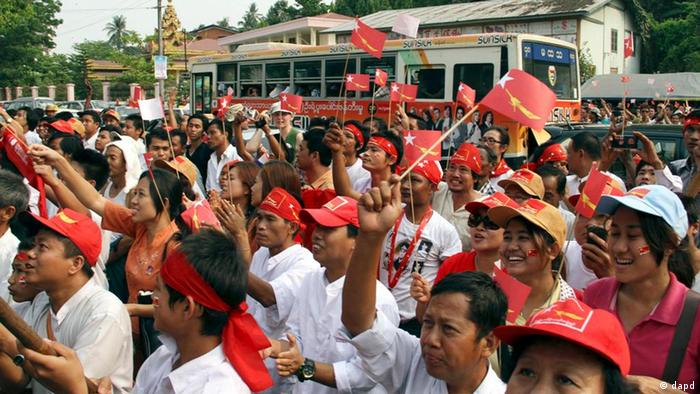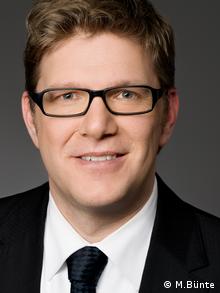
In an interview with DW, Marco Bünte from the GIGA Institute for
Asian Studies, one of a team of international election observers in
Myanmar, speaks of the voters' hopes but warns democracy won't appear
overnight.
Marco Bünte studied political science, history and English
literature at Münster University. He has been a Research Fellow with the
GIGA Institute of Asian Studies in Hamburg since 2003.
DW: According to an election commission announcement on state television Aung San Suu Kyi's National League for Democracy (NLD) has won in 43 of the 44 constituencies in which it fielded candidates. How did people in Myanmar react to the preliminary results?
Marco Bünte: People were very happy when the first results started coming through and they heard that the NLD had won in almost all the constituencies - especially in the capital Naypyidaw. There was a great deal of enthusiasm, people were dancing on the streets and celebrating this victory for democracy.
After 22 years of resistance, Aung San Suu Kyi is entering parliament for the first time. Is a new era beginning?
Of course the results represent a great success for the NLD although they won't change the power structures that much for the time being. However, with its voice in parliament it will be able to continue the course of reform with President Thein Sein. However, whether the democratization process finally is carried out will only be clarified at the next parliamentary elections in 2015 when all the seats will be up for grabs. Only then will the NLD be able to win a majority and effectively change the power structures.
Aung San Suu Kyi and the NLD will be outnumbered by the military in parliament. Can the voters' high expectations be fulfilled?
They cannot expect too much of Aung San Suu Kyi because she is only part of the parliament and not of the government. The NLD knows that it will only have a small voice in parliament. The level of democracy till now has been very low and the dictatorship has strong roots. The next few years will be about solving the problems together. This means peace talks with ethnic minorities, economic reconstruction and modernizing the political system. The changes cannot take place overnight.
 Marco Bünte from the GIGA Institute of Asian Studies in Hamburg is cautiously hopeful about Myanmar
Marco Bünte from the GIGA Institute of Asian Studies in Hamburg is cautiously hopeful about Myanmar
Were the elections free and fair in your view?
On the day of the polls, the NLD did complain that there were problems with the voter lists. Many people were unable to vote because they were not on the list. However, these are technical details which might have been down to poor organization and weaknesses in the registration process. There was no sign of systematic election fraud. I did not witness a massive military presence or intimidation on the part of the state either. So I would say that the election - and the results show this too - were free and fair.
Apart from free and fair elections, the EU has set two further conditions for lifting sanctions - the release of political prisoners and reconciliation with ethnic minorities. Do you think the sanctions should be removed?
There are still political prisoners. The question is how many. There has to be an agreement with the government as to who is considered a political prisoner and who is locked up as a criminal. A dialogue with the government has begun. It's much more difficult with the ethnic minorities. There are many groups which are still fighting. The ceasefire talks have been very fragmentary. President Thein Sein has made a start but since it's a matter related to the division of power between the center and local governments, the process will last several years. There is an urgent need for external help. The country has been isolated for many years and it's extremely important that the West support Myanmar in its modernization process, in education, in legal matters and in many other areas.
How does the future of Myanmar look?
The country has made impressive progress. What's important is that Myanmar continues on its path of reform and that there is reconciliation between the government and the opposition. This could be the necessary breakthrough for the elections in 2015.
Interview: Gero Simone / act
Editor: Sarah Berning
DW: According to an election commission announcement on state television Aung San Suu Kyi's National League for Democracy (NLD) has won in 43 of the 44 constituencies in which it fielded candidates. How did people in Myanmar react to the preliminary results?
Marco Bünte: People were very happy when the first results started coming through and they heard that the NLD had won in almost all the constituencies - especially in the capital Naypyidaw. There was a great deal of enthusiasm, people were dancing on the streets and celebrating this victory for democracy.
After 22 years of resistance, Aung San Suu Kyi is entering parliament for the first time. Is a new era beginning?
Of course the results represent a great success for the NLD although they won't change the power structures that much for the time being. However, with its voice in parliament it will be able to continue the course of reform with President Thein Sein. However, whether the democratization process finally is carried out will only be clarified at the next parliamentary elections in 2015 when all the seats will be up for grabs. Only then will the NLD be able to win a majority and effectively change the power structures.
Aung San Suu Kyi and the NLD will be outnumbered by the military in parliament. Can the voters' high expectations be fulfilled?
They cannot expect too much of Aung San Suu Kyi because she is only part of the parliament and not of the government. The NLD knows that it will only have a small voice in parliament. The level of democracy till now has been very low and the dictatorship has strong roots. The next few years will be about solving the problems together. This means peace talks with ethnic minorities, economic reconstruction and modernizing the political system. The changes cannot take place overnight.
 Marco Bünte from the GIGA Institute of Asian Studies in Hamburg is cautiously hopeful about Myanmar
Marco Bünte from the GIGA Institute of Asian Studies in Hamburg is cautiously hopeful about MyanmarOn the day of the polls, the NLD did complain that there were problems with the voter lists. Many people were unable to vote because they were not on the list. However, these are technical details which might have been down to poor organization and weaknesses in the registration process. There was no sign of systematic election fraud. I did not witness a massive military presence or intimidation on the part of the state either. So I would say that the election - and the results show this too - were free and fair.
Apart from free and fair elections, the EU has set two further conditions for lifting sanctions - the release of political prisoners and reconciliation with ethnic minorities. Do you think the sanctions should be removed?
There are still political prisoners. The question is how many. There has to be an agreement with the government as to who is considered a political prisoner and who is locked up as a criminal. A dialogue with the government has begun. It's much more difficult with the ethnic minorities. There are many groups which are still fighting. The ceasefire talks have been very fragmentary. President Thein Sein has made a start but since it's a matter related to the division of power between the center and local governments, the process will last several years. There is an urgent need for external help. The country has been isolated for many years and it's extremely important that the West support Myanmar in its modernization process, in education, in legal matters and in many other areas.
How does the future of Myanmar look?
The country has made impressive progress. What's important is that Myanmar continues on its path of reform and that there is reconciliation between the government and the opposition. This could be the necessary breakthrough for the elections in 2015.
Interview: Gero Simone / act
Editor: Sarah Berning
紐約時報
 India in One, Two or Three WeeksBy GUY TREBAY
Three insider itineraries for visiting one of the world's most compelling and confounding countries.
 Now Is the Season for JapanBy PICO IYER
A year after last year's catastrophe, Japan is more vulnerable, and thus more wide open, than ever.
 36 Hours in Vientiane, LaosBy NAOMI LINDT
Vientiane, with its gilded temples and colonial villas, is quickly changing. Visit now before it is enveloped by the modern world.
 PRACTICAL TRAVELERTours of Asia's Wild SideBy MICHELLE HIGGINS
Tiger safaris in India and bird-watching in Cambodia are just a few of the new adventure tours on offer.
 OVERNIGHTERThe Lure of History in a Malaysian CityBy NAOMI LINDT
Just two hours from Kuala Lumpur, Malacca is attracting millions of visitors with its vivid history and new hotels.
 SURFACING
|






沒有留言:
張貼留言